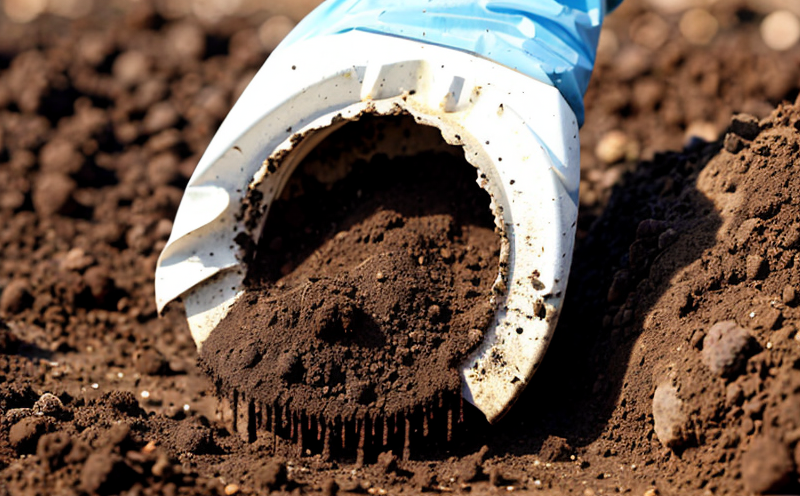DIN 38414-5 Soil Eluate Preparation Test
The DIN 38414-5 standard is a widely recognized method used in environmental testing to determine the leachable fractions of pollutants from soil. This test plays a crucial role in evaluating whether contaminants present in soil can migrate into groundwater or surface water, posing potential risks to human health and the environment.
The process involves preparing eluate samples from soil specimens under controlled conditions. The prepared eluates are then analyzed for their chemical composition, including metals, organic compounds, and other pollutants. This information is essential for regulatory compliance and risk assessment in various sectors such as construction, agriculture, and waste management.
Our laboratory specializes in conducting DIN 38414-5 tests with precision and accuracy. We use state-of-the-art equipment and follow strict protocols to ensure reliable results. Our team of experts ensures that every step from sample collection to final report is conducted according to the latest standards, providing you with a comprehensive understanding of soil quality and contamination levels.
The test protocol involves several key steps:
- Sampling: Soil samples are collected from designated areas following standard procedures.
- Preliminary Analysis: Initial analysis determines the type and amount of pollutants present in the soil.
- Sieving: The soil is sieved to ensure uniform particle size, which affects the elution process.
- Eluate Preparation: Soil is mixed with distilled water or other specified solvents under controlled conditions.
- Extraction: The mixture is allowed to stand for a specific duration before filtration and analysis.
- Analysis: Quantitative and qualitative analysis of the extracted pollutants.
The results from this test are critical for several applications, including:
- Evaluation of soil contamination levels.
- Determination of leachable fractions to assess potential risks.
- Supporting regulatory compliance with environmental regulations.
- Providing data for remediation projects and site assessments.
The DIN 38414-5 test is not only a standard in Germany but is also referenced internationally, making it applicable across various jurisdictions. Understanding the leachable fractions of pollutants helps in developing effective strategies to mitigate risks associated with contaminated soil.
| Key Parameters | Description |
|---|---|
| Pollutants Tested | Metals, organic compounds, and other contaminants. |
| Sampling Methodology | Absorption or extraction-based methods depending on the pollutant type. |
| Extraction Medium | Distilled water or other specified solvents as per DIN 38414-5. |
| Standards Compliance | DIN 38414-5, ISO 10627-5 |
| Extraction Time Variations | Description |
|---|---|
| Short-Term (24 Hours) | Used for quick preliminary assessments. |
| Long-Term (7 Days) | Prioritizes the extraction of complex and persistent pollutants. |
The DIN 38414-5 test is essential in environmental management, ensuring that soil quality meets regulatory standards and does not pose a risk to public health. By providing accurate and reliable results, our laboratory supports informed decision-making processes for stakeholders involved in environmental protection.
Applied Standards
The DIN 38414-5 standard is part of the broader set of German standards that focus on soil testing. These standards are harmonized with international standards such as ISO and EN to ensure consistency across different countries and regions.
| Standard Code | Description |
|---|---|
| DIN 38414-5 | Method for determining leachable fractions of pollutants from soil. |
| ISO 10627-5 | Standard methods for the determination of leachable metals in municipal solid waste. |
| EN ISO 12457 | Methods for the determination of organic compounds in soil, sludge and sewage sludge. |
The DIN 38414-5 standard is particularly relevant for projects involving contaminated sites, waste management facilities, and agricultural land. It provides a robust framework for assessing the potential leaching of pollutants into the environment, thereby facilitating informed decisions in risk assessment and remediation.
Benefits
The implementation of DIN 38414-5 testing offers numerous benefits to organizations involved in environmental management. By adhering to this standard, you can ensure that your soil quality meets regulatory requirements, thereby avoiding costly fines and penalties.
- Regulatory Compliance: Ensures adherence to local and international regulations related to soil contamination.
- Risk Assessment: Provides critical data for assessing the potential risks associated with soil pollutants.
- Sustainable Practices: Supports sustainable land use practices by identifying and mitigating environmental hazards.
- Stakeholder Confidence: Builds trust among stakeholders, including regulatory bodies, community groups, and investors.
- Data for Remediation: Offers comprehensive data to guide remediation efforts effectively.
- Scientific Understanding: Enhances scientific understanding of soil pollution dynamics and its impact on the environment.
In summary, DIN 38414-5 testing is a vital tool for environmental protection, supporting sustainable development initiatives and ensuring compliance with international best practices.
Quality and Reliability Assurance
- Laboratory Accreditation: Our laboratory is accredited by reputable bodies such as ISO/IEC 17025, ensuring the highest standards of quality.
- Expertise: Our team comprises highly skilled professionals with extensive experience in environmental testing.
- State-of-the-Art Equipment: We utilize advanced instrumentation and technology to ensure accurate and precise results.
- Continuous Training: Regular training programs for staff to stay updated on the latest methodologies and best practices.
- Standard Operating Procedures (SOPs): Comprehensive SOPs are in place to guide every step of the testing process, from sample collection to final analysis.
- Quality Control: Rigorous quality control measures are implemented at each stage of the test to ensure consistency and reliability.
Our commitment to quality and reliability ensures that you receive accurate and reliable results every time. We pride ourselves on delivering services that meet or exceed industry standards, thereby providing peace of mind to our clients.





